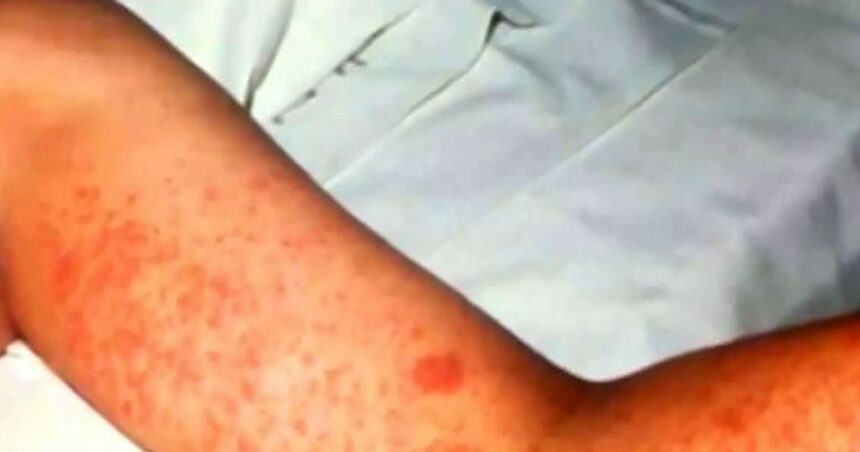I step out of the Sudbury Health Unit just as the late afternoon sun catches the red brick of the building. A strange weight hangs in the air, and it’s not just the humidity of early spring in Northern Ontario. Inside those walls, public health officials are confronting something they haven’t seen in a decade—a confirmed case of measles in an infant too young to be vaccinated.
“We’re taking this very seriously,” Dr. Penny Sutcliffe tells me, her voice carrying the measured calm of someone who’s navigated public health crises before. As Medical Officer of Health for Public Health Sudbury & Districts, she’s spent the morning coordinating the response to the region’s first measles case since 2014. “When you work in public health long enough, you develop this sense—this understanding that the diseases we’ve pushed back through vaccination are always waiting for an opportunity to return.”
The infant, whose family has requested privacy, reportedly contracted the virus while traveling outside Canada. This detail matters—it indicates the case was imported rather than the result of community transmission, which would signal a more widespread problem. Still, the confirmation sent ripples through the region’s healthcare community.
Measles is often misunderstood as simply a childhood rash, but its reality is far more severe. The virus is among the most contagious known to medicine, capable of lingering in the air for up to two hours after an infected person has left a room. For every 1,000 children infected, one or two will die despite the best medical care. Others may develop pneumonia or encephalitis, a dangerous swelling of the brain.
The Sudbury case highlights a growing vulnerability across Canada. National vaccination rates have been slipping over the past decade, with the Public Health Agency of Canada reporting that only about 87% of two-year-olds had received the recommended MMR vaccine doses in recent years—below the 95% needed for effective community protection.
“We’ve been lulled into a false sense of security,” explains Dr. Nisha Thampi, an infectious disease physician at CHEO in Ottawa who has studied vaccine hesitancy. “When vaccination rates drop even slightly, we create pockets of vulnerability where these diseases can take hold again.”
Walking through downtown Sudbury the day after the announcement, I notice parents outside a daycare center talking in hushed tones. One mother bounces her infant on her hip while speaking with another parent.
“I just called our doctor to check his records,” she tells the other woman. “He’s had his first shot but not the second one yet.”
This is the reality of a measles scare—the sudden awareness of protection gaps. The standard MMR (measles, mumps, rubella) vaccine schedule in Ontario provides the first dose at 12 months and a second at 4-6 years. Infants under one year, like the affected baby in Sudbury, remain vulnerable because maternal antibodies can interfere with vaccine effectiveness in very young babies.
At the Northern Ontario School of Medicine, Dr. Sarita Verma points to a deeper issue. “What we’re seeing now isn’t just about this one case,” she explains as we sit in her office overlooking Lake Ramsey. “It’s about the growing divide in how we understand public health. Vaccines became victims of their own success—people stopped fearing diseases they never saw.”
Public Health Sudbury & Districts has initiated contact tracing, identifying people who may have been exposed during the infant’s infectious period. They’ve established a special hotline and issued alerts to healthcare providers throughout the region. The health unit has also opened extra vaccination clinics to accommodate concerned parents wanting to ensure their children are protected.
At Laurentian University, sociology professor Dr. Aurélie Lacassagne studies how health information travels through communities. “The response in the next few weeks will be crucial,” she says. “When people feel informed and empowered rather than lectured to, they’re more likely to make decisions that protect public health.”
Indigenous communities across Northern Ontario face additional challenges. Health Navigator Debbie Recollet, who works with First Nations communities around Sudbury, notes the complexity of the situation. “There’s historical trauma around government health directives in many communities,” she explains. “Building trust means acknowledging that history while providing clear information about the very real risks of measles.”
The Sudbury case exists in a broader context of resurging vaccine-preventable diseases. The World Health Organization reported a 30% increase in measles cases globally in 2023, with outbreaks occurring in previously measles-free regions. In Canada, cases have remained relatively rare, but public health experts warn that could change.
By the time I leave Sudbury three days after the announcement, the initial shock has transformed into determined action. At a community center downtown, nurses administer vaccines while answering questions from parents. Public health workers distribute information in multiple languages. School nurses review immunization records.
This moment reveals something essential about public health—it functions best as a community effort rather than an individual choice. As one father at the vaccination clinic put it while waiting with his toddler, “I’m not just doing this for my kid. I’m doing it for the babies who can’t get vaccinated yet.”
Dr. Sutcliffe hopes this case serves as a wake-up call without developing into something worse. “The measures we’re taking now—the contact tracing, the vaccination clinics—these are the invisible scaffolding of public health,” she says. “Most people never see this work until something goes wrong. But it’s always there, ready to respond.”
As I board my train back to Toronto, I think about that infant in Sudbury—too young for a vaccine that would have prevented their illness—and about the collective shield we create when enough of us are immunized. The return of measles to Sudbury after a decade’s absence isn’t just a medical event. It’s a reminder of both our vulnerability and our responsibility to each other.






